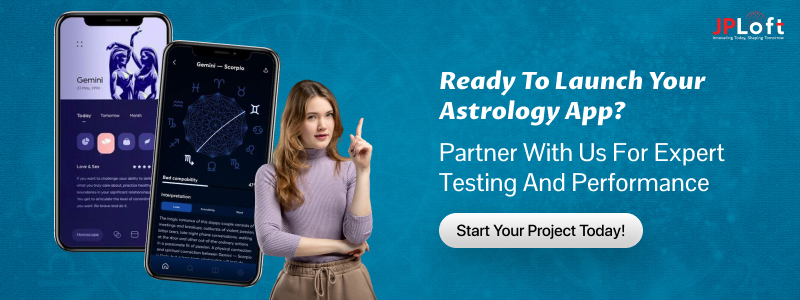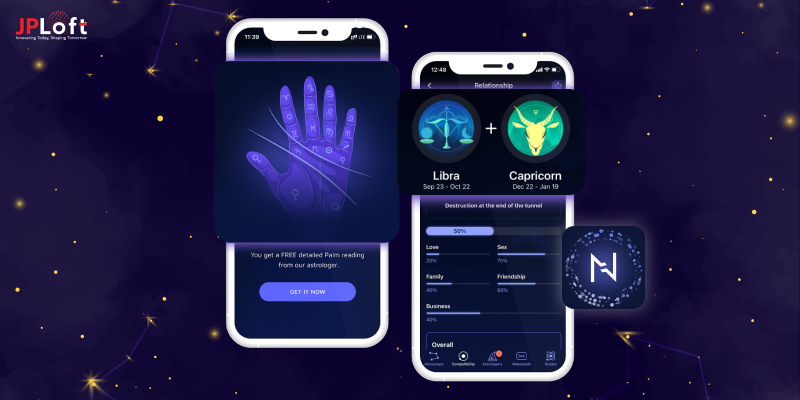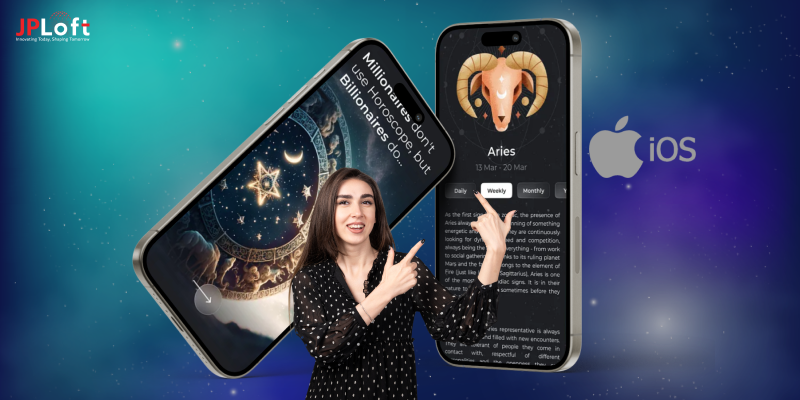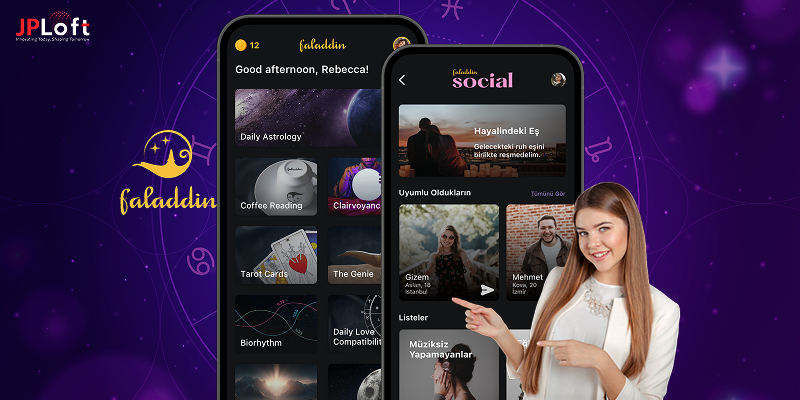Key Takeaways
The astrology app market is rapidly expanding, with an estimated value of USD 9 billion by 2030, driven by Millennials and Gen Z.
Testing is crucial to ensure prediction accuracy, secure user data, smooth performance, cross-device compatibility, and an engaging app.
Astrology app testing includes defining objectives, functional testing, validating inputs, cross-platform checks, performance, security, and regular maintenance.
Testing costs vary between USD 8,000 to USD 15,000 for basic apps and can rise to USD 20,000 to USD 50,000 for feature-rich, highly secure apps.
Popular tools for testing are Appium, BrowserStack, Firebase Test Lab, XCUITest/Espresso, Applitools, Katalon Studio, Testsigma, and Autify.
JPLoft offers specialized astrology app testing with expertise in AI, functional and security testing, continuous support, and customized solutions.
Astrology apps have revolutionized the way users connect with personalized predictions, cosmic insights, and spiritual guidance through their smartphones. However, with growing user expectations for accuracy, security, and seamless experiences, rigorous testing is essential before and even after the launch of the astrology app.
Hence, here the question arises “ how to test an astrology app?”
Well, to test an astrology app, you need to follow through a list of steps that all begins with identifying the core purposes, analyzing app’s purpose, and requirements, and ends on conducting continuous testing parameters.
This comprehensive guide to astrology app testing demystifies each phase of the quality assurance process, from planning through post-release maintenance. Whether aiming to deliver detailed daily horoscopes or interactive live consultations, following structured testing strategies ensures every feature, data calculation, and user journey is reliable.
Hence, let’s dive into the process of testing.
All About Astrology Apps and Their Market Growth
An astrology app is a mobile application that provides users with personalized astrological insights based on their birth chart, zodiac sign, and other celestial factors. These apps typically offer features like daily horoscopes, birth chart analysis, compatibility readings, and personalized predications.
Astrology apps have surged in popularity over the past decade, blending ancient mysticism with modern mobile app tech stacks to deliver personalized horoscopes, birth chart analyses, tarot readings, and live astrologer consultations. These apps deliver insights into health, career, and relationships by analyzing planetary positions and zodiac signs.
These astrology apps appeal to users seeking guidance, self-awareness, and spiritual connection, especially among Millennials and Gen Z. Popular platforms like Co-Star, The Pattern, and Nebula have pioneered AI-driven predictions and real-time consultations.
Many astrology apps incorporate multi-system approaches, gamified elements, community forums, and notifications for celestial events to boost engagement. Their convenience, user-centric personalization, and access to expertise make astrology apps widely appealing for anyone seeking fast, digital guidance on life’s big questions.
Here is a detailed overview of the astrology app market statistics according to recent data:
-
The breeder astrology and mystical services industry is estimated at USD 12 billion as of 2023, with expectations to surpass USD 22 billion by 2031, as estimated by TheVox.
-
According to TMCnet, the global astrology app market is valued to be around USD 3 billion in 2024 and is projected to grow to USD 9 billion by 2030 with a CAGR of ~20%.
-
According to a study by GlobalGrowthInsights, over 59% of users are Millennials or Gen Z, 48% engage daily, and 41% pay for regular subscriptions.
-
In research by Axios, popular astrology apps like Co-Star saw massive traction, surpassing 20 million downloads in the US, attracting new funding of USD 15 million.
The astrology app market is riding a strong trajectory, fueled by technological enhancements (AI, personalization), engaging monetization models, and a cultural shift toward alternative wellness. Retaining users, safeguarding privacy, and ensuring credibility remain essential for long-term success.
This makes it essential to look beyond recent astrology app trends and focus on the foundation of user trust with rigorous testing. Let’s explore why testing an astrology app is so important.
Why is Testing an Astrology App Important?
With millions of users relying on such apps for guidance, entertainment, and even decision-making, ensuring their quality becomes crucial. The astrology app testing guide plays a pivotal role in guaranteeing accuracy, performance, and a seamless user experience.
1. Accuracy of Predictions and Data
Astrology apps depend on complex algorithms and vast databases of planetary positions, charts, and calculations. A minor glitch or miscalculation can lead to inaccurate predictions, damaging the app’s credibility. Testing verifies that the app delivers precise horoscope readings, compatibility analyses, and astrological insights without errors.
2. User Experience and Engagement
Astrology apps often combine personalized content with interactive features such as live chat with astrologers, tarot readings, or detailed birth charts. Rigorous testing ensures that the interface is intuitive, smooth, and free of bugs. A well-tested app keeps users engaged by providing fast navigation, easy onboarding, and visually appealing astrology app designs that enhance trust and satisfaction.
3. Performance and Scalability
Given the global appeal of astrology apps, they must handle large volumes of simultaneous users, especially during special astrological events or festive seasons. Performance testing ensures the app remains stable, responsive, and scalable under heavy traffic.
4. Security of Personal Information
Astrology apps often collect sensitive data such as birth details, names, and contact information. Without robust security testing, this data could be vulnerable to breaches or misuse. Testing validates encryption, secure payment gateways, and safe user authentication to protect user privacy and build trust.
5. Compatibility Across Devices
Users access astrology apps on different smartphones, tablets, and operating systems. Testing ensures cross-platform compatibility, so features like horoscope notifications, in-app purchases, and live streaming work smoothly on all devices.
6. Building Trust and Retention
An astrology app’s success relies heavily on trust. If users encounter inaccurate data, frequent crashes, or poor performance, they are likely to abandon the app. Regular testing minimizes risks, enhances app store ratings, and improves customer retention.
Understanding how to test an astrology app is about ensuring credibility, safeguarding user trust, fixing bugs, and delivering a smooth, reliable experience. For astrology apps, where accuracy and engagement directly influence user loyalty, thorough testing is essential to achieving long-term success with the help of an on-demand app development service provider.
The next step is choosing the right resources to achieve those goals. Let’s explore the best tools to use for astrology app testing in 2025 that can simplify the process, enhance efficiency, and deliver reliable results.
Best Tools to Use for Astrology App Testing in 2025
If you are developing an astrology app or testing it in 2025, selecting the right tools is essential for functionality testing, UI validation, and ensuring accuracy in complex astrological calculations, seamless compatibility, and strong security. Here’s a breakdown of the top tools used in astrology app testing, based on the latest industry insights:
1] Appium
A popular open-source framework for automating both Android and iOS (native, hybrid, and web) apps. It has cross-platform support, flexibility in scripting (Java, Python, JavaScript), a strong community, and an AI-powered element locator for dynamic mobile app designs.
2] BrowserStack App Live
A cloud-based solution offering access to 3,000+ real devices for manual and exploratory testing. No setup needed. Supports biometric and 5G device testing, which is great for validating UI, notifications, and performance across device types.
3] Firebase Test Lab
A cloud lab dedicated to Android, enabling automated testing across both virtual and physical devices. Built-in integration with Android Studio/CI tools and ML-based UI exploration to improve script reliability.
4] XCUITest (iOS) and Espresso (Android)
Native frameworks for UI automation: XCUITest for iOS (Swift/Objective-C) and Espresso for Android (Java/Kotlin). Offer stability, speed, and tight integration with platform ecosystems (Xcode for iOS and Android's tooling), minimizing flakiness.
5] Applitools
An AI-driven tool for visual testing that automatically detects UI regressions and accessibility issues. Ideal for astrology apps where visual precision matters (charts, personalized UI elements).
6] Katalon Studio
An all-in-one low-code automation platform that supports web, mobile, API, and desktop testing. Offers both codeless and script options, rich integrations (Jira, CI tools), plus visual testing via Applitools.
7] Testsigma
Cloud-based testing platform with support for web, mobile, API integration in astrology apps, and enterprise applications, enhanced by AI automation. Features autonomous testing and supports multiple test types in a unified environment, excellent for comprehensive and agile QA cycles.
8] Autify Mobile
Low-code, AI-powered platform for UI testing on real iOS/Android devices using image-based recognition. Short learning curve, high test stability across versions, and seamless CI/CD integration.
► Suggested Stack for 2025 Astrology App QA
-
Mobile Automation: Appium + Espresso/XCUITest for thorough coverage.
-
Visual Verification: Applitools for the reliability of UI and charts.
-
Cloud Device Testing: BrowserStack or Firebase Test Lab for a vast device range.
-
Low-Code Option: Katalon Studio or Autify for faster entry with less scripting.
-
Cross-Type Automation: Katalon Studio or Autify for faster entry with less scripting.
Now that we’ve explored the best tools available for astrology app testing in 2025, the next step is understanding how to apply them effectively. Let’s walk through the steps to astrology app testing to ensure accuracy, security, and a seamless user experience.
Steps to Conduct Astrology App Testing Effectively
As astrology apps are a blend of science, mathematics, and cultural tradition, their success largely depends on accuracy, reliability, security, and user experience.
The process of astrology app testing efficiently requires a structured approach that goes beyond typical mobile app testing. Below are the easy steps to astrology app testing:
Step 1: Define Testing Objectives and Scope
First, it’s important to outline the goals of testing. An astrology app deals with sensitive data inputs and precise algorithm-driven outputs. Objectives should include:
-
Ensuring the accuracy of horoscope predictions and charts.
-
Testing for usability and smooth navigation.
-
Validating data privacy and security.
-
Checking performance under peak loads during celestial events or festivals.
A clearly defined scope ensures that the QA team doesn’t miss critical elements that directly impact user trust.
Step 2: Analyze Requirements and App Features
Each astrology app is unique. Some may provide simple daily horoscopes, while others include advanced features such as:
-
Personalized natal chart generation or compatibility reports.
-
Live chats or calls with astrologers.
-
AI-driven prediction models.
-
Premium subscriptions and in-app purchases.
Testers must analyze these requirements carefully to prepare a testing strategy that covers both functional and non-functional aspects.
Step 3: Prepare Comprehensive Test Cases
Well-defined test cases to test an astrology app are the backbone of effective results. They should cover:
-
Functional Scenarios: Horoscope generation, user onboarding, login, notifications, and chart rendering.
-
Negative Testing: Incorrect date/time/place inputs, missing fields, and invalid subscription transactions.
-
Edge Cases: Leap years, unusual time zones, remote locations, or daylight-saving time changes.
-
Personalization Checks: Daily horoscope notifications tailored to each user’s birth chart.
Creating detailed test cases helps ensure no critical functionality is overlooked.
Step 4: Conduct Functional Testing
Functional testing verifies whether the app performs as expected. For astrology apps, this step includes:
-
Validating horoscope accuracy by comparing outputs with standard astrological references.
-
Checking whether birth charts and compatibility results are generated correctly.
-
Ensuring features like premium unlocks, chats, and predictions function seamlessly.
Since astrology heavily depends on credibility, functional testing is crucial for building user trust.
Step 5: Test Data Input and Validation
Astrology apps rely on precise user inputs such as date, time, and place of birth. Testers must:
-
Validate all input formats (DD/MM/YYYY vs. MM/DD/YYYY).
-
Check error handling for incorrect or incomplete inputs.
-
Ensure the app supports multiple languages and regional date-time formats.
Strong input validation prevents miscalculations and ensures users always get accurate results.
Step 6: Perform Cross-Platform and Device Compatibility Testing
Users access astrology apps on diverse devices like Android, iOS, tablets, and different screen sizes. Compatibility testing should confirm that:
-
UI elements and charts render properly on all devices.
-
Notifications work across operating systems.
-
Navigation remains smooth and intuitive regardless of screen size.
Cloud-based device testing tools like BrowserStack or Firebase Test Lab can simplify this process.
Step 7: Validate Performance and Scalability
Astrology apps often face spikes in traffic during events such as eclipses, zodiac changes, or festive days. Performance testing ensures that the app:
-
Handles high concurrent user loads without crashing.
-
Responds quickly to horoscope requests or chart generation.
-
Scales efficiently as user numbers grow.
Load testing and stress testing help prevent downtime and improve reliability.
Step 8: Conduct Security Testing
Since astrology apps collect personal data (birth details, names, payment info), data security is a top concern. QA teams must:
-
Test for data encryption during storage and transmission.
-
Ensure secure authentication and two-factor login options.
-
Validate payment gateways for secure transactions.
-
Check compliance with data protection laws (GDPR, CCPA).
Robust security testing safeguards sensitive information and strengthens user confidence.
Step 9: Test Notifications and Personalization Features
Push notifications are a major engagement driver in astrology apps. Testers should verify that:
-
Notifications are timely, relevant, and tailored to user profiles.
-
No duplicate or irrelevant messages are sent.
-
Users can customize notification preferences.
Accurate personalization ensures stronger user retention.
Step 10: Leverage Automation and AI Testing
Astrology apps require frequent updates with new features and astrological events. Manual testing alone may be insufficient. Automation helps with:
-
Regression Testing: Ensures updates don’t break existing features.
-
Data-Driven Testing: Validates horoscope calculations across massive datasets
-
AI-Powered Predictive Testing: Identifies high-risk areas prone to bugs
Automation speeds up testing cycles, while AI enhances accuracy and efficiency.
Step 11: Conduct Beta Testing and Gather Feedback
Before the official launch, beta testing with a limited user group helps identify real-world issues. Early feedback highlights:
-
Usability problems.
-
Calculation inaccuracies.
-
Feature improvement opportunities.
This step bridges the gap between testing in controlled environments and real-world use.
Step 12: Continuous Testing and Maintenance
Astrology app maintenance is dynamic and requires frequent updates to stay relevant. Continuous testing ensures:
-
Smooth integration of new features.
-
Consistent performance across updates.
-
Ongoing compliance with security standards.
A long-term testing strategy is necessary to maintain trust and reliability.
Testing an astrology app requires ensuring accuracy, performance, security, and user engagement. By following this structured guideline for astrology app testing, we covered everything from defining objectives and preparing test cases to leveraging automation and continuous testing.
A well-tested app boosts credibility, enhances user retention, and long-term success in the competitive market. This is where AI comes into play, transforming traditional testing approaches with automation, predictive insights, and enhanced accuracy. Let’s explore how AI can further enhance the astrology app testing guide.
How Can AI Enhance Astrology App Testing?
AI in astrology apps is transforming the way software testing is conducted, and astrology apps are no exception. With millions of users seeking personalized predictions, real-time horoscopes, and interactive experiences, ensuring quality is crucial. The role of AI in astrology app testing brings in efficiency, accuracy, and intelligence, making the process faster and more reliable.
► Automating Complex Calculations
Astrology apps rely on intricate algorithms that calculate planetary positions, zodiac interactions, and compatibility scores. Manual testing of these calculations is time-consuming and prone to errors. AI testing tools can simulate vast datasets, validate results instantly, and detect anomalies with greater accuracy, ensuring that predictions remain consistent and trustworthy.
► Predictive Analytics for Bug Detection
Building an AI app can help analyze past testing data to predict where bugs are most likely to occur in an astrology app. For instance, if errors frequently arise in generating natal charts or compatibility readings, AI can highlight these areas for prioritized testing. This proactive approach reduces time-to-market and minimizes critical failures.
► Enhancing User Experience Testing
Astrology apps thrive on engagement through personalized content, live chats, and notifications. AI-driven usability testing tools can analyze user behavior patterns, identify friction points in navigation, and suggest improvements for smoother onboarding and interaction. By simulating real user journeys, AI ensures the app delivers a seamless experience.
► Natural Language Processing (NLP) for Content Testing
Astrology apps often deliver text-heavy predictions and daily horoscopes. NLP-based AI tools can check grammar, tone, and context to ensure messages are clear, personalized, and free from repetitive or irrelevant content. This enhances the credibility and relatability of astrological insights.
► Security and Fraud Detection
Since astrology apps collect sensitive data such as birth details and payment information, AI can strengthen security testing. Machine learning models can detect unusual login patterns, fraudulent activities, or potential data leaks, ensuring user trust and data protection.
► Continuous Testing and Updates
Astrology apps are regularly updated with new features, events, or premium services. AI-driven continuous testing ensures that updates do not break existing functionalities. Automated regression testing powered by AI helps maintain stability while rolling out frequent upgrades.
AI enhances the astrology app testing guide by bringing automation, precision, and intelligence into the process. From validating astrological calculations for improving astrology app security and user experience, AI empowers developers to deliver high-quality, reliable apps. Understanding the cost to test an astrology app helps balance innovation with budget, ensuring the app delivers both reliability and value.
Does Astrology App Testing Add Extra Cost? – A Quick Breakdown
On average, to test an online astrology app with basic features might cost around USD 8,000 to USD 15,000. Testing a feature-rich, enterprise-level app with high security and automation requirements could cost USD 20,000 to USD 50,000. The cost of testing an astrology app depends on several factors, such as app complexity, features, testing methods, and the expertise of the QA team.
Type of Testing for Astrology App
Below is a detailed breakdown to help you estimate expenses for an average basic astrology app:
|
Type of Testing |
Estimated Cost (in USD) |
Description |
|
Functional Testing |
$1,000 – $5,000 |
Validates features like horoscope generation, compatibility reports, and navigation. |
|
Performance & Load Testing |
$2,000 – $7,000 |
Ensures the app works smoothly under heavy traffic, especially during astrological events. |
|
Security Testing |
$3,000 – $10,000 |
Critical for protecting user data with advanced penetration testing. |
|
Compatibility Testing |
$1,500 – $6,000 |
Verifies smooth performance across devices and platforms. |
|
Automation Testing |
$5,000 – $15,000 |
For apps with frequent updates, automation reduces long-term costs but requires an initial setup investment. |
Factors Influencing Cost of Testing
-
App Complexity: A simple daily horoscope app will cost far less to test compared to an advanced app with live astrologer chats, AI-based predictions, and premium features.
-
Team Location: The location of the testing team affects the cost a lot. Hiring QA teams in North America or Europe is costlier than outsourcing from other regions.
-
Testing Tools: Using premium automation or AI-driven astrology app testing tools may increase upfront costs but save money long-term.
-
Frequency of Updates: Astrology apps often update with new features or content, which increases ongoing regression testing costs.
The process of astrology app testing is an investment in accuracy, credibility, and user trust. While the testing cost may look like an add-on to the overall development cost of the astrology app, it ensures precise predictions, secure data, and smooth performance. All of these directly impact user retention and revenue. By balancing manual and automated testing approaches and choosing the right QA partner, businesses can optimize costs while delivering a reliable astrology app experience.
While understanding the cost to follow the online astrology app testing guide gives businesses a clear idea of investment, it’s equally important to recognize the practical hurdles that come with the process. Let’s explore the key obstacles teams often face while testing astrology apps.
Challenges to Overcome While Testing Astrology Apps
Astrology apps are digital tools that provide personalized horoscopes, predictions, and guidance that users often take seriously. As creating an app for astrology is complex, testing it presents unique challenges that extend beyond standard mobile app testing.
To ensure accuracy, trust, and usability, testers must be prepared to address these obstacles. Below, we have briefly described a few common astrology app development challenges faced during the implementation of the guide to astrology app testing:
1. Ensuring Accuracy of Predictions
Astrology apps rely on intricate algorithms based on celestial calculations, time zones, and astrological rules. Even a small error in data processing can lead to inaccurate predictions. Testing must verify that algorithms deliver precise outputs consistently, which is a challenge due to the vast number of possible chart combinations.
2. Handling Diverse User Inputs
Variations in input formats, incorrect entries, or missing data can cause miscalculations. Testers must account for all input scenarios and validate how the app handles edge cases without crashing or producing misleading results.
3. Cross-Platform and Device Compatibility
Users access astrology apps on a wide range of devices, operating systems, and screen sizes. Ensuring consistent performance, smooth navigation, and proper rendering of charts across platforms is a challenge. This requires extensive compatibility testing, which can be time-consuming.
4. Data Security and Privacy Concerns
Since astrology apps collect personal information, including names, birth details, and payment data, safeguarding user privacy is essential. Testing for secure data storage, encrypted transactions, and compliance with data protection regulations presents an ongoing challenge for QA teams.
5. Managing High User Traffic
Popular astrology apps often witness traffic spikes during special celestial events, zodiac transitions, or festive occasions. Ensuring that the app performs optimally under heavy load without downtime or crashes requires robust performance and stress testing.
6. Maintaining Trust and Credibility
User trust is central to astrology apps. Even minor bugs, delays, or inaccuracies can harm credibility. Continuous astrology app testing and frequent updates are necessary to maintain high standards, which adds to the testing complexity.
In a competitive market where trust and engagement are vital, leveraging advanced astrology app testing guide methods can give astrology apps a distinct edge, as it is important to ensure accuracy, mobile app security, and trustworthiness. Overcoming these challenges is essential for delivering a reliable app that users can depend on for guidance and insights.
By following proven best practices and partnering with the best mobile app development company in the UK, QA teams can overcome these obstacles and enhance the quality and reliability of astrology apps.
Best Practices to Improve Astrology App Testing
Advanced astrology app tech stacks blend immensely with highly personalized content that users rely on for guidance. Since accuracy, security, and seamless performance are critical to building user trust, following best practices in astrology app testing becomes essential.
By implementing structured and strategic approaches, QA teams can significantly improve the reliability and success of astrology apps. Here is the list of the best practices to consider for enhancing the astrology app testing.
1] Validate the Accuracy of Algorithms
Testers should rigorously verify algorithms against known astrological standards to ensure that predictions, charts, and compatibility results are error-free. Automating validation using large datasets can improve accuracy and efficiency.
2] Test for All Input Variations
Since astrology apps rely on sensitive inputs like date, time, and location of birth, it’s important to test edge cases such as incorrect formats, missing data, or unusual geographic entries. Input validation testing ensures the app delivers results without crashing or misleading the user.
3] Ensure Multi-Device and Cross-Platform Compatibility
With users accessing apps across iOS, Android, and different screen sizes, compatibility testing is crucial. Testers should simulate diverse environments to confirm that charts render correctly, navigation is seamless, and other astrology app features function consistently across platforms.
4] Implement Robust Security Testing
Astrology apps store personal data, like payment features for premium services. QA teams must test for encryption, secure authentication, and compliance with data protection standards to safeguard user information. Regular penetration testing further strengthens security.
5] Conduct Performance and Load Testing
Astrology apps often experience spikes in user activity during major celestial events or festivals. Load and stress testing help ensure the app remains stable and responsive even under heavy traffic. Performance tuning should be a continuous process.
6] Use Automation for Regression Testing
Since astrology apps frequently release updates, automated regression testing ensures that new features don’t break existing functionality. Automation also accelerates testing cycles, allowing faster and more reliable deployments.
7] Focus of Personalization and Notifications
Push notifications and personalized horoscopes drive user engagement. Testers must verify that users receive timely, relevant, and accurate messages tailored to their profiles. Any mismatch can erode trust quickly.
Improving guideline for astrology app testing requires a balance of manual and automated approaches, with a strong focus on accuracy, security, and user experience. By following these best practices, mobile app maintenance services and QA teams can deliver apps that inspire confidence, maintain credibility, and keep users engaged.
Choosing the Right Testing Partner—Why JPLoft Excels
Choosing JPLoft as your astrology app testing partner is a strategic decision that guarantees superior quality and seamless performance for your app.
With over a decade of experience in mobile app development, JPLoft specializes in astrology and horoscope app solutions tailored to your unique business needs. Our expert team combines modern technologies such as AI and machine learning to ensure your app delivers accurate predictions and an engaging user experience.
JPLoft’s comprehensive testing process includes rigorous functional testing, compatibility checks across devices, performance optimization, and stringent security audits, safeguarding sensitive user data. In addition, we also provide continuous support, maintenance, and updates post-launch, helping your app stay ahead of industry changes and evolving user demands.
Collaborate with JPLoft, an astrology app development company, to confidently launch an app that connects, motivates, and delights users worldwide while maximizing business value.
Conclusion
Understanding how to test an astrology app goes far beyond routine quality checks. Testing ensures accuracy, security, and reliability for users who deeply trust the insights these apps provide. From verifying algorithmic precision to safeguarding personal data, each testing step contributes to building credibility and engagement.
Following this guide to astrology app testing, with the right balance of manual, automated, and AI-powered testing, businesses can deliver apps that perform consistently across platforms, scale seamlessly under high demand, and keep user information secure.
A well-tested astrology app not only improves user satisfaction but also boosts retention, app store ratings, and long-term growth. In a competitive digital market, effective testing is the foundation for delivering trustworthy astrological experiences.
FAQs
Test an astrology app by verifying feature functionality, horoscope and chart calculation accuracy, and data privacy. Check performance under load, compatibility across devices, and conduct usability testing. Address bugs, retest after fixes, and ensure compliance before launch.
Testing ensures accuracy in predictions, secures sensitive user data, and delivers a smooth user experience. Since astrology apps rely heavily on credibility, even minor errors can affect user trust and retention.
Key testing types include functional testing, performance/load testing, security testing, compatibility testing, regression testing, and usability testing. Each plays a crucial role in ensuring the app’s reliability.
Costs vary depending on app complexity, features, and testing methods. On average, testing may range from USD 8,000 to USD 15,000 for basic apps and USD 20,000 to USD 50,000 for feature-rich enterprise-level apps.
Yes, automation speeds up regression testing, validates horoscope calculations across large datasets, and ensures faster release cycles. AI-driven testing tools also help predict risk-prone areas for better accuracy.












Share this blog